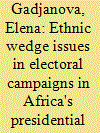|
|
|
Sort Order |
|
|
|
Items / Page
|
|
|
|
|
|
|
| Srl | Item |
| 1 |
ID:
154514


|
|
|
|
|
| Summary/Abstract |
Formulating ethnic wedge issues is an important, yet overlooked, strategy for cross-ethnic mobilization in Africa's presidential regimes where coalitions are needed to win elections. Ethnic wedge issues are rhetorical tools intended to splinter the support of a key opponent by employing narratives of ethnically motivated discrimination, victimization, or exclusion, and promising remedial action. They are often put forward by challengers and target minorities within incumbents’ coalitions for whom ethnicity is salient, who vote as a bloc, and who are a regional majority. Ethnic wedge issues can inflame ethnic resentments, entrench existing conflicts, and limit the space for compromise on contentious issues. Drawing on an analysis of recent presidential campaigns in Kenya and Zambia, this article illustrates the logic of the use of ethnic wedge issue appeals, as the salience of ethnicity varies within countries. It contributes to the growing literature on parties’ voter outreach strategies in sub-Saharan Africa. The research has implications for the continued salience of ethnicity in plural societies and for the structure of political cleavages in Africa's democratizing states.
|
|
|
|
|
|
|
|
|
|
|
|
|
|
|
|
| 2 |
ID:
185834


|
|
|
|
|
| Summary/Abstract |
Social media misinformation is widely recognized as a significant and growing global problem. Yet, little is known about how misinformation spreads across broader media ecosystems, particularly in areas with varying internet access and connectivity. Drawing on research in northern Ghana, we seek to address this gap. We argue that ‘pavement media’—the everyday communication of current affairs through discussions in marketplaces, places of worship, bars, and the like and through a range of non-conversational and visual practices such as songs, sermons, and graffiti—is a key link in a broader media ecosystem. Vibrant pavement and traditional media allow for information from social media to quickly cross into offline spaces, creating a distinction not of the connected and disconnected but of first-hand and indirect social media users. This paper sets out how social, traditional, and pavement media form a complex and deeply gendered and socio-economically stratified media ecosystem and investigates its implications for how citizens differentially encounter, process, and respond to misinformation. Based on the findings, we argue that efforts intended to combat the spread of misinformation need to move beyond the Western-centred conception of what constitutes media and take different local modalities of media access and fact-checking into account.
|
|
|
|
|
|
|
|
|
|
|
|
|
|
|
|
|
|
|
|
|